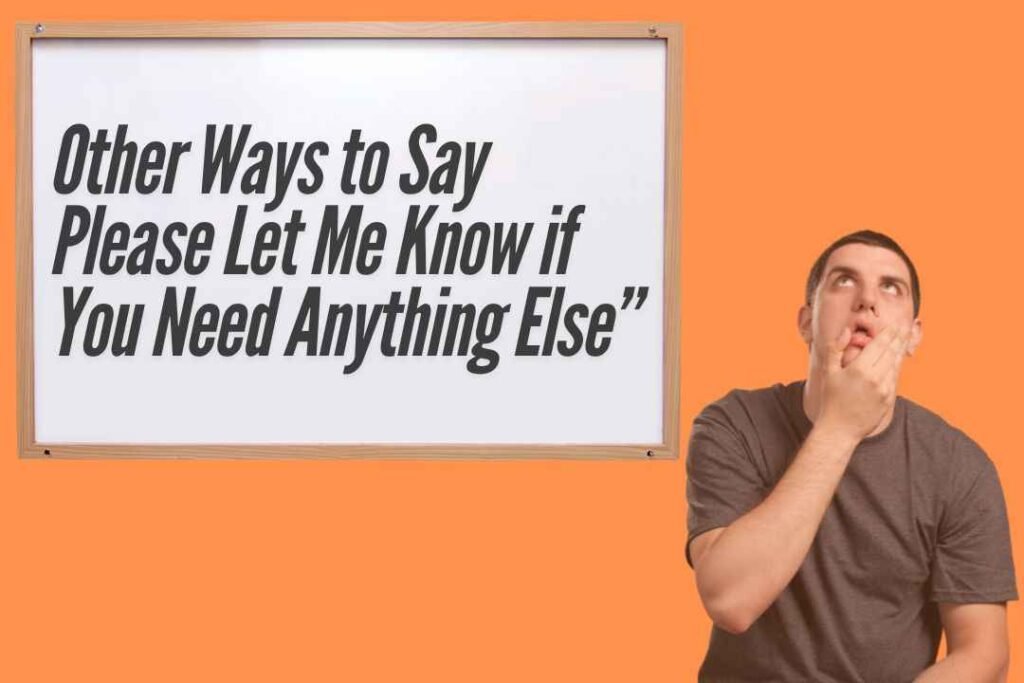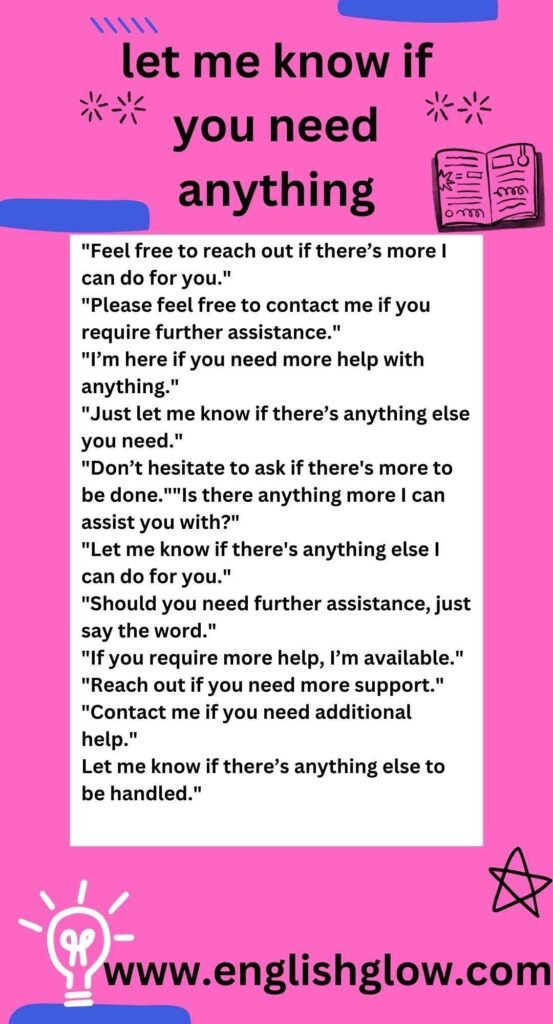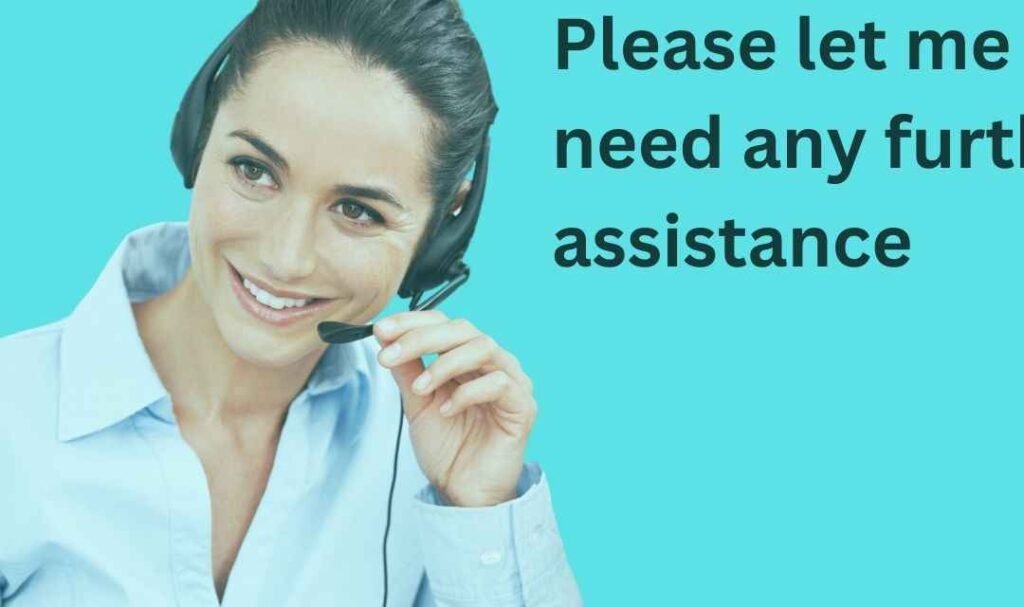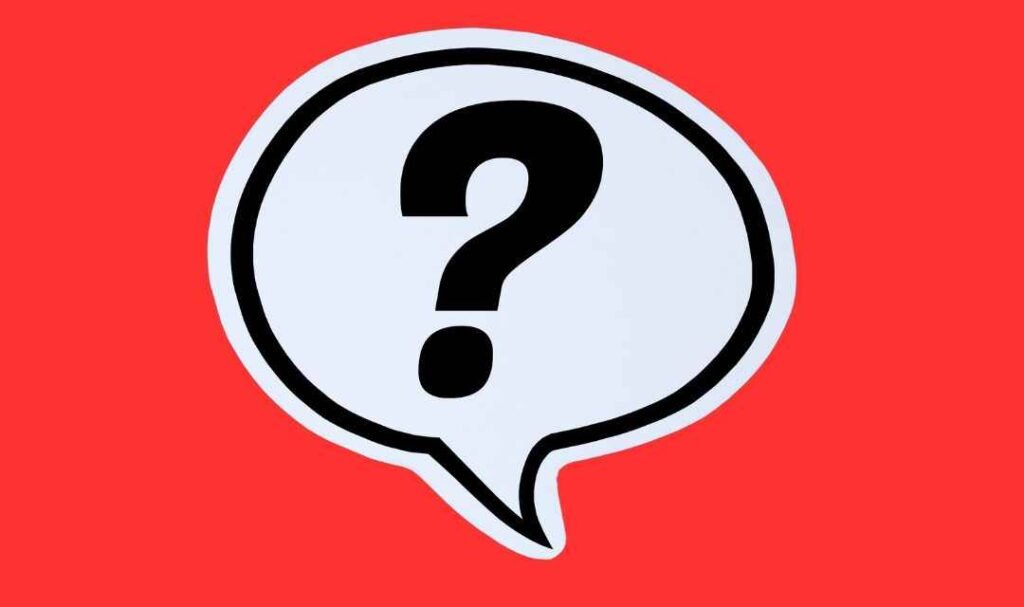Offering help is a key part of communicating, especially in emails and messages. Sometimes, saying, “Please let me know if you need anything else,” feels too repetitive. In this article, we explore twelve other ways to express this idea. Each alternative is explained with examples to show how you can make your communication more engaging and appropriate for different situations. These options will help you avoid repetition and ensure your offers of assistance are well-received.
In the realm of communication, a few phrases stand out for their versatility and inherent kindness. Among these, “Please let me know if you need anything else” holds a special place. It is an offer of assistance, a symbol of willingness to help, and a beacon of empathy. This article dives into the nuances of this ubiquitous phrase, dissecting the various contexts in which it fits perfectly.
By presenting alternative phrases that carry the same generous spirit, this guide aims to help our readers become better communicators while fostering stronger, more empathetic relationships. Armed with this knowledge, you can approach your professional and personal interactions with confidence, knowing you have a variety of expressions at your disposal to show your willingness to assist and connect with others effectively.
Is It Professional to Say “Please Let Me Know if You Need Anything Else”?
Yes, saying “Please let me know if you need anything else” is considered professional in both formal and informal settings, depending on the context. This phrase is definitely polite and versatile, used in various communication settings to indicate that you are willing to provide further assistance. It’s particularly useful in emails, meetings, and customer service interactions to ensure the recipient knows you’re available to help with additional queries or concerns.
It’s best used when you’ve already provided some information or completed a task for someone, and want to offer further support. It’s a polite way to close a conversation, signaling you’re open to continuing the interaction if the other person needs more help. This phrase not only shows professionalism but also enhances the quality of your service by making the other person feel supported and valued.
Pros
Using variations of the phrase “Please let me know if you need anything else” shows willingness to help further, making the interaction positive. It enhances communication clarity and openness, which are crucial for effective exchanges. Additionally, it builds goodwill and a supportive atmosphere, essential aspects in fostering positive relationships in both professional and personal contexts. This approach encourages ongoing dialogue and cooperation, making it a valuable tool for maintaining healthy interactions and ensuring all parties feel acknowledged and supported in their needs.
Cons
While the phrase “Please let me know if you need anything else” is widely accepted and understood, it may be perceived as overly formal in very casual settings, potentially creating a sense of distance or a lack of genuine familiarity between the parties. This can sometimes make the communication seem less personal and more robotic, which isn’t ideal in situations where a warm, friendly tone is more appropriate. Additionally, this phrase could be seen as unnecessary if the conversation has clearly ended, making the sender seem unaware of social cues. This might lead to awkwardness or a misinterpretation of the sender’s social skills.
Moreover, some recipients may prefer more specific ways of offering help, which can be more directly applicable to the situation and show a deeper understanding of the recipient’s needs. Generic phrases like “Please let me know if you need anything else” might not fully convey the sender’s willingness to assist with particular issues or tasks, which could be critical in professional or highly personalized contexts. Using a different phrase can help avoid repetition in ongoing communications, enhancing the personalization and thoughtfulness of each interaction.
Deciding whether to use a different phrase often hinges on the desired tone, the level of formality, and personal or organizational communication styles, allowing for a more tailored and effective exchange. This flexibility ensures that each party’s communication remains relevant and resonates with the context of their relationship, promoting better engagement and mutual understanding.
You might enjoy reading: Loot vs Lute Uncovering the Surprising Connection
12 Other Ways to Say “Please Let Me Know if You Need Anything Else”
When looking to offer help in your communications, using a variety of phrases can make your messages feel fresh and considerate. Here are twelve alternatives to the classic phrase “Please let me know if you need anything else”:
“Feel free to reach out if there’s more I can do for you.”
“Please feel free to contact me if you require further assistance.”
“I’m here if you need more help with anything.”
“Just let me know if there’s anything else you need.”
“Don’t hesitate to ask if there’s more to be done.”“Is there anything more I can assist you with?”
“Let me know if there’s anything else I can do for you.”
“Should you need further assistance, just say the word.”
“If you require more help, I’m available.”
“Reach out if you need more support.”
“Contact me if you need additional help.”
Let me know if there’s anything else to be handled.”
Using these different ways to offer help not only makes your communication more engaging but also shows your attention to detail and your willingness to assist further. Each alternative helps to reinforce your role as a supportive contact, ready to help with whatever your colleagues, friends, or clients may require.
1. Please let me know if you need any further assistance.
This alternative phrase is perfect when you want to add a touch of formality without sounding overly stiff. It’s a suitable option, particularly in professional contexts, as it emphasizes your willingness to continue providing support. It’s effective in email correspondence with clients or colleagues, especially if you’ve already provided some assistance. This phrase not only reassures the recipient of your availability but also conveys your readiness to help them with any additional needs they might have.
2. Feel free to reach out for further assistance.
This version of the phrase is slightly more informal and helps create a friendly atmosphere, suggesting that the recipient has the freedom to contact you at their convenience. It’s an ideal choice for messages where you want to appear approachable, making it suitable when you aim to offer a relaxed yet supportive tone. This expression reassures the recipient without overwhelming them, letting them know they can easily ask for help whenever needed.
3. Please feel free to contact me if you need any further assistance.
When you’re crafting professional emails or messages, the way you offer assistance matters a lot. One common phrase often used is “Please let me know if you need anything else.” While it’s polite and friendly, it may not always feel the most professional in every setting. The goal is to express willingness to help while keeping the tone both formal and respectful.
Below, we’ll explore other ways to phrase this sentiment that may sound more refined and better suited for various professional contexts.
This phrase strikes a balance between politeness and formality, making it perfect for professional settings. It reassures the recipient that they’re welcome to reach out, even if their previous queries or issues seem resolved. Using “feel free” conveys that you’re approachable and that they can contact you without hesitation.
Feel free: Implies openness and that the person doesn’t have to worry about being bothersome.
Contact me: More direct, but still friendly, signaling your readiness to address further needs.
Need further assistance: Clearly emphasizes that you’re available to help with any complex issue or additional questions they may have.
This phrase works especially well after you’ve provided detailed information or helped resolve a complex issue. It subtly communicates that while the primary matter has been addressed, you’re still available to assist with anything that might come up.
In my personal experience, I’ve found that this subtle shift in wording helps to open up a conversation more naturally. Instead of sounding like a generic phrase, it communicates genuine availability. For example, when dealing with clients or colleagues, this phrasing is often appreciated, as it invites further dialogue without being too forward.
Feel free to use this when you wish to emphasize your availability to assist, especially in customer service or project management scenarios where issues often arise over time, and it’s important to keep the line open for follow-up communication.
4. Let me know if there’s anything more I can do for you.
This phrase offers a less formal yet personalized approach, showing a great deal of dedication to fulfilling the recipient’s needs completely. It implies a willingness to go beyond what has already been done and subtly encourages open communication, making the other person feel valued. This way of expressing your availability shows a genuine interest in assisting further, leaving the door open for any additional support that might be required. It’s a great way to show that you are fully committed to serving and are attentive to their situation.
5. I’m here if you need anything else.
This informal, friendly way of offering help gives off a relaxed, approachable vibe, making it ideal for conversations with colleagues or clients you share a good relationship with. The phrase works well when you want to keep the lines of communication open without sounding overly formal. It’s a perfect choice for a quick follow-up message, ensuring that the other person feels comfortable reaching out. This approach shows you are genuinely there to support them, without pressuring them, and it can be a great way to maintain a smooth, ongoing dialogue.
6. Let me know if there’s anything else I can help with.
This versatile alternative strikes a balance between formal and informal, making it a great way to wrap up a message after offering specific help but still being open to provide more. It’s a friendly yet professional choice that suits most communication scenarios, especially when you want to show you’re ready to assist without assuming the recipient needs additional support. By using this approach, you leave the door open for further interaction while keeping the tone welcoming and considerate.
7. Please let me know if anything else is needed.
This formal way of offering assistance is suitable for professional business contexts where you want to position yourself as attentive and ready to provide further help. It’s particularly effective at the end of a detailed conversation or service, clearly signaling that you’re alert to any extra requirements. By using this phrase, you maintain a polite and respectful tone, showing your willingness to meet any needs that may arise.
8. Please contact me if you need further assistance.
This formal, direct phrase makes a solid choice in professional settings, as it clearly invites the recipient to get in touch if they require more assistance. It emphasizes your role as a supportive contact, offering a reliable alternative well-suited for emails or messages where you need to follow up on a query or service. It provides a clear call to action, ensuring the recipient knows they can count on you for continued help without hesitation.
9. Should you need more help, please let me know
This alternative is more formal than the original phrase, making it a polite way to offer further assistance. It suggests your readiness without being too forward, which works well in professional settings where maintaining a formal tone is key. This version subtly indicates you’re willing to provide more help while leaving the door open for future requests. It’s especially suited for situations where you want to be respectful and show your availability without imposing. It’s perfect for emails to clients or senior colleagues who appreciate a higher level of formality.
10. I’m here if you need more help
This phrase is somewhat informal and conveys a friendly, approachable tone, making it a great way to offer additional help. It makes you seem accessible and personable, which is ideal for conversations with colleagues you know well or in less formal email exchanges. Use this when you want to give your message a personal touch, especially when communicating with someone you have a more casual relationship with. It helps build rapport and makes the recipient feel comfortable reaching out for more assistance.
11. Please feel free to contact me if you still need help
This alternative is both professional and polite, striking a balance between formality and accessibility. It suggests openness to further communication and reassures the recipient that help is available upon request. The phrase is versatile, suitable for a wide range of scenarios—from customer service to internal team communications. It’s particularly effective when you want to encourage ongoing dialogue or offer support in cases that might require follow-up assistance. It shows you’re not just a one-time helper but a reliable, continuous support resource.
12. Is there anything else I can help you with?
This direct, polite question is a great way to offer further assistance. It encourages the recipient to voice any additional needs or concerns they might have, making your approach very engaging as it invites a response and fosters a two-way communication channel. It’s well-suited for customer service roles or any situation where you want to ensure the recipient’s needs are fully met, showing your commitment to helping in any way possible.
13. Don’t Hesitate to Ask if You Need Help
This phrase encourages the person to feel comfortable reaching out.
Don’t hesitate shows you are open and willing to assist.
It’s a great way to show empathy and availability.
14. Just Reach Out if You Need Anything
Using just reach out makes it sound informal and friendly.
It’s a simple way to let someone know you’re there to help with whatever they might require.
This phrase keeps the tone approachable and easy-going.
15. If There’s Anything You Need, Just Tell Me
Direct and to the point.
Using just tell me emphasizes that you are ready to help right away.
This is effective when you want to be clear about your willingness to assist.
16. Keep Me Posted if You Need Any Assistance
Keep me posted signals that you want to stay informed and are ready to help if needed.
It’s a friendly reminder that you’re available without being too formal.
This phrase works well in both professional and casual contexts.
17. Please Inform Me if You Require Anything
A more formal way to offer help.
Using please inform me conveys respect and shows attentiveness.
This phrase is often used in professional or business settings.
18. Do Make Sure You Tell Me if You Need Anything
Do make sure adds emphasis and shows that you genuinely want to assist.
It feels encouraging and supportive, indicating your readiness to help.
This phrase adds a bit of urgency, showing you care.
19. If You Need Anything, Ensure You Let Me Know
Using ensure you let me know emphasizes that you really want to be contacted if there’s a need.
This phrase suggests a proactive approach, showing you are prepared to assist.
20. Just Flag Me if There’s Anything You Need
Just flag me is a casual way to ask someone to get your attention if they need help.
It’s informal and relaxed, making it suitable for friendly or casual environments.
This phrase suggests you are easy to reach and approachable.
21. If You Require Anything, Don’t Hesitate to Inform Me
This combines politeness and encouragement.
Don’t hesitate to inform me reassures the person that asking for help is okay and welcomed.
It’s often used in customer service or formal conversations.
22. Shout if You Need Anything
This is a very informal and casual way to offer help.
Shout if you need anything implies that the person can feel free to reach out quickly and without reservation.
It’s playful and relaxed, often used among friends or close colleagues.
23. Just Drop Me a Line if You Need Anything
Drop me a line is a friendly way to say “message me.”
This is perfect for emails or text messages where you want to keep the tone light.
It shows you’re available and willing to help without sounding too formal.
24. Get in Touch if There’s Anything You Need Help With
Get in touch is versatile and can be used in both personal and professional situations.
It’s a gentle reminder that you are there to assist if needed.
Using help with makes it clear you are offering support with any issue.
This structure provides various ways to say, “Let me know if you need anything,” making your communication more varied and engaging.
How To Answer Formal
The phrase, “Please let me know if you need anything,” is a common, polite request often used in both professional and personal scenarios to show a willingness to assist or provide further help. The best response typically varies on context. For instance, during a business meeting, if your superior uses this phrase, a formal response could be, “Thank you for your offer, I’ll reach out should I require your assistance.” Alternatively, if a client service provider extends the same offer, you might reply, “I appreciate your service, I’ll let you know if I have any queries.” In social events, when the host extends this offer, a polite response could be, “Thank you for your hospitality, I’ll certainly let you know.” These interactions emphasize courtesy and professionalism, so it’s essential to maintain a formal tone in your reply.
The phrase, “Please let me know if you need anything,” is a common, polite request often used in both professional and personal scenarios to show a willingness to assist or provide further help. The best response typically varies on context. For instance, during a business meeting, if your superior uses this phrase, a formal response could be, “Thank you for your offer, I’ll reach out should I require your assistance.” Alternatively, if a client service provider extends the same offer, you might reply, “I appreciate your service, I’ll let you know if I have any queries.” In social events, when the host extends this offer, a polite response could be, “Thank you for your hospitality, I’ll certainly let you know.” These interactions emphasize courtesy and professionalism, so it’s essential to maintain a formal tone in your reply.
‘Give a Shout if You Need Something’
The phrase, “Please let me know if you need anything,” can be communicated in a more laid-back way without losing its essence. A friendly and approachable version, especially amongst close friends or family, might be “give a shout if you need something” or simply “anything you need, just holler.” These more relaxed alternatives are great when you’re dealing with individuals you have an established relationship with, or when the social setting is less formal. They still convey the same message of offering assistance, but in a way that encourages a deeper connection and understanding, minimizing any perceived barriers that might arise from formal communication.
For instance, in a casual conversation with a colleague or friend, you could say, “Don’t hesitate to give me a holler if there’s something you need help with.” This shows you are approachable and ready to assist, but without the stiffness of formal language. It’s the kind of tone that invites openness and creates a welcoming environment for more relaxed exchanges.
These alternative phrases are not only friendly but also make communication feel more personal and less transactional, enhancing the relationship between the people involved.
How To Answer Informally
In everyday communication, especially in casual settings, the phrase “Please let me know if you need anything” is often used to show someone’s willingness to help. It’s a versatile and common response that shows support or offers assistance in many situations. However, in informal settings, there are several alternative ways to express the same sentiment, making the conversation feel more relaxed and friendly. For instance, a host might say to guests, “Give me a shout if you need a hand,” or a friend going through a tough time might offer support by saying, “If you need something, just ask.”
These more casual alternatives reflect a warm, familiar tone. They create a welcoming atmosphere and invite the other person to feel comfortable asking for help. “Holler if you need anything” or “Need anything?” are perfect examples of how you can adjust your language to fit the situation. It’s about using words that match the relationship with the recipient and the tone of the conversation.
If you’re responding to someone offering help, you might reply informally with something like, “Thanks for your email. I don’t need anything right now, but I’ll definitely reach out if something comes up.” This keeps the conversation casual and friendly while still acknowledging the offer of help.
You might enjoy reading: Is County Capitalized? Unlock the Secret to Proper Usage
Is It Correct to Say “please let me know if you need anything”?
Yes, indeed, it is absolutely correct to say “Please let me know if you need anything.” This phrase is a commonplace and widely used expression, considered cordial and polite. It is sometimes used in a formal way to offer assistance but can also be used in more casual conversations. The phrase demonstrates a willingness to assist, creating a sense of thoughtfulness and regard toward the recipient. It strikes a perfect balance between being too formal and too casual, keeping a respectful tone while allowing the recipient the comfort to respond freely.
You can use such a phrase in various contexts—whether at work, during a casual conversation, or when offering help in customer service. It shows that you’re ready to respond to specific needs, enhancing the interaction and relationship. By offering assistance, you’re not just making a generic offer, but you’re expressing a desire to help and respond to what the other person might specifically need, making the communication more effective.
When you say, “Please let me know if you need anything,” you’re essentially giving the other person the communicative ball in their court. It encourages them to ask for help freely, making the interaction both effective and considerate.
Final Thoughts
Choosing the right way to offer help can make a big difference in how your message is received. By using the alternatives provided, you can match your tone to the situation, whether it needs to be more formal or casual. These options show that you care about the recipient’s needs and are willing to assist further. The right phrase can significantly impact the effectiveness of your communication. Whether you’re aiming for a professional, casual, polite, or urgent tone, these alternatives to “Please let me know if you have any questions” can help you convey your message more effectively. Remember, every interaction is an opportunity to build relationships and convey value, so the next time you’re about to type that closing line, consider these alternatives to make your communication stand out.






